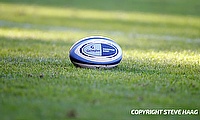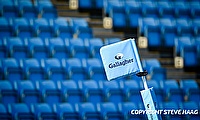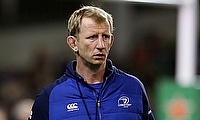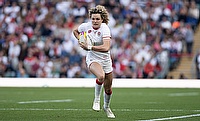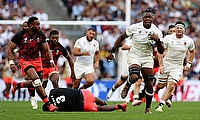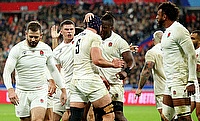England's O'Connor dilema
There are two types of international rugby player.
Firstly, you have the player born, or at least bred, in the nation they represent. They have spent their entire lives dreaming of donning that jersey and wear it with incredible pride.
Secondly, you have the naturalised player. They may have been born and bred elsewhere, but they’ve moved to their adopted nation for financial or lifestyle reasons and end up representing their new nation rather than the one of their birth.
It is not to say that the naturalised player wears that jersey with any less pride than a native player. If the player has spent a few seasons at least in that country, then there’s every chance he understands innately what it is to wear that crest on his chest and has fully delved into the culture of his adopted homeland.
No one would question the obvious pride that South African Brad Barritt has when he represents England, but when he first arrived in the country, was it really his dream to don the rose?
These are the questions surrounding Leicester Tigers’ new openside flanker Brendon O’Connor, who is English-qualified due to his maternal grandmother. Thanks to his ancestry, O’Connor does not have to wait three years to qualify on residency, despite having spent his entire life in New Zealand.
Eddie Jones now faces a potentially polarising decision early in his reign, as to whether or not he should pick New Zealander in his upcoming Six Nations squad.
O’Connor was the standout player in a disappointing season for the Blues this year and was rewarded with their Player of the Season award, seeing off competition from the likes of Jerome Kaino and Charles Piutau. He has since made the move north and his savvy at the breakdown has already won him plenty of plaudits despite featuring in just three games for his new side.
Pragmatically speaking, it’s verging on a no-brainer for Jones. England have consistently struggled to be a dominant force at the breakdown since the back row trio of Richard Hill, Neil Back and Lawrence Dallaglio hung up their boots and while there is fetching potential among England’s considerable player pool, there is no standout candidate.
Will Fraser may be the most destructive breakdown operator England have but an unfortunate injury proneness has so far prevented him from making the leap to test level. Matt Kvesic has been the most consistent English openside but similarly to Fraser, has been unable to make the leap from Aviva Premiership star to international regular. With Chris Robshaw seemingly seen as a six by Jones and Steffon Armitage still unavailable for selection, O’Connor has quickly risen through ranks.
O’Connor is no one-trick pony, either. He has great handling skills, good attacking instincts and like any openside worth his salt, links the forwards and backs excellently in the loose.
All of that said, O’Connor is, first and foremost, a Kiwi. He grew up in Gisborne, on the east coast of the North Island, and attended Gisborne Boys’ High School, whose other notable alumni include the Gear brothers, Hosea and Rico.
Like any rugby player attending that school, O’Connor will have dreamt of one day donning the famous silver fern and representing the All Blacks at international level. The aforementioned Barritt would have been no different with the Springboks when he first arrived in England, but he was not immediately thrust into the England equation. Barritt spent four years in England before winning his first senior cap, albeit having represented the Saxons in the intermediary, and had the time to appreciate what is to be English and what it means to wear the jersey.
Now, international rugby is a very different beast to what it once was, especially in the northern hemisphere. Scotland fielded six southern hemisphere players at this year’s Rugby World Cup, all of whom had qualified to wear the thistle after three years of residency or through a grandparent. There seems to be little room left for sentimentality in the test arena and nations seem more than happy to pick the best players available, regardless of where they come from.
To some, this is not an issue. If it improves the quality of the international team – and therefore encourages more native youngsters to take up the sport - then who are they to argue?
To others, it jars. Representing one’s nation is the highest honour available to them and that honour is made a little more questionable if they are featuring in a side which has a number of foreign players who have been drafted in to improve the team’s fortunes.
Wherever you stand in this debate, it likely dictates your stance towards O’Connor and England. Both views have their merits, but it will be interesting to see which stance Jones takes. As a foreign coach, will he applaud the skill set O’Connor brings and draft him straight in? Or will he ask the Tiger to earn his stripes in Leicester first?
For all the ills of the relatively short residency period required to play for a nation other than your own, it does afford the player the time to adapt to their new country and adopt much of its culture. For example, who do you think relates more to being English right now, Nathan Hughes or O’Connor?
Hughes has spent almost two and a half years in England, has an appreciation for what it is to be English and wants to don the red rose, but won’t be able to until the summer of 2016, yet O’Connor, who has been in the country for around two months, is in the selection debate for the upcoming Six Nations.
My own personal opinion is that O’Connor is a fantastic rugby player who would improve England if selected. He would bring a guile at the breakdown that England currently lack and he would be far from the first naturalised player to add to English rugby at test level.
I was, however, critical of Scotland’s call-up of John Hardie prior to the Rugby World Cup and it would be hypocritical of me not to feel the same in regards to O’Connor and England. He has a bright future with England, but perhaps that future should be postponed until at least the summer tour. Let him spend a season at Leicester, soak up the culture and speak to English stalwarts like Ben Youngs and Dan Cole. He can find out from them what it means to wear the red rose.
This is of course more than a little idealistic of me. I’m not Eddie Jones, my job is not dependent on delivering results. From a pragmatic standpoint, O’Connor would help England win games and if other nations are willing to pick foreign players in this fashion, why shouldn’t England?
Barring a remarkable change of heart and a return to New Zealand, it seems inevitable that O’Connor will one day run out for England and that’s something English fans should be excited about. Whether or not it happens at the 2016 Six Nations is another matter, but one which should provide plenty of animated discussions over the next two months.

